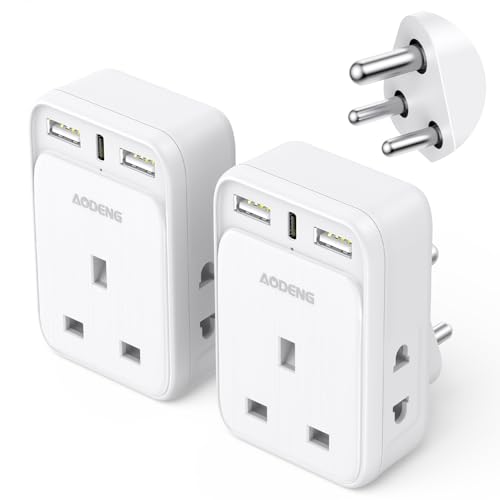In Saint Kitts and Nevis, they use Type A, B, D, and G plugs and sockets. The mains voltage is 230 V, and the frequency is 50 Hz.
So, you’ll definitely need a travel adaptor in Saint Kitts and Nevis. Their plugs and sockets aren’t the same as our Type G back in the UK.
Key Takeaways
- Plugs and sockets: A, B, D, and G
- Mains voltage: 230 V
- Frequency: 50 Hz
- Travel adaptor needed? Yes, you do need a travel adaptor
- Voltage converter needed? No, you won’t need a voltage converter here.
- Recommended travel adaptor: AUNNO Universal Travel Adapter and the Aodeng Plug Adaptor
The details provided here come directly from local electricity authorities, international standards such as the IEC, and practical feedback shared by travellers across the globe.
Sockets in Saint Kitts and Nevis
In Saint Kitts and Nevis, you’ll find Type A, B, D, and G plugs and sockets.
Type A

Type A sockets have two flat parallel pins and no grounding. Unlike Type G, they don’t include an earth pin, which makes them less secure.
Type B

Type B sockets have two flat parallel pins plus a round grounding pin. Unlike Type G, the pins are thinner and there’s no built-in fuse.
Type D

Type D sockets have three large round pins in a triangular shape. Unlike Type G, they lack a fuse and the pins are round rather than rectangular.
Type G

Type G sockets have three rectangular pins arranged in a triangular pattern, with a built-in fuse for safety. They are the standard used in the United Kingdom.
Recommended Travel Adaptor for Saint Kitts and Nevis
We’ve carried out hands-on testing and checked adaptors against tough criteria. In this country, you can’t rely on just one adaptor. These are the ones worth packing.
Recommended Travel Plug Adaptor (A and B)
by 1,500+ travellers on Amazon
Recommended Travel Plug Adaptor (D)
by 1,000+ travellers on Amazon
Forgotten your adaptor and already abroad? Don’t worry — airports and local shops usually stock them. That said, packing your own saves you from high prices and poor quality.
Saint Kitts and Nevis is often combined with nearby islands like Antigua and Barbuda and Saint Martin. It’s smart to check those pages too — plug types and voltage can vary a bit.
Do You Need a Voltage Converter?
You’ll only ever need a voltage converter if your device’s voltage doesn’t match the country’s. In Saint Kitts and Nevis you won’t need one — the mains voltage is roughly the same as in the UK.
Check your device’s voltage rating before plugging in abroad. If you see ‘100–240 V, 50/60 Hz’, you’re in luck — no converter required, as is the case with most modern electronics.

Top Travel Essentials to Take With You
Beyond your adaptor, a few clever travel items can make life on the road so much easier. A luggage scale saves you money, a power bank keeps you powered up, and packing cubes keep your clothes tidy. They’re simple, practical, and genuinely useful.




